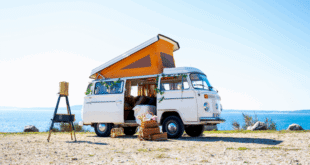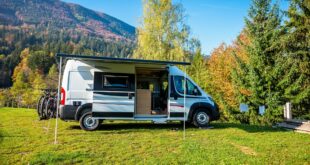A motorhome journeys through Spain’s beautiful landscapes—knowing the rules ensures a hassle-free road trip.
Credit : Maridav. Shutterstock
Do you dream of driving the open road in Spain and enjoying a summer of freedom there? Motorhome and caravanning trips are the new adventure for couples, families and solo travellers.
But do you know the rules that’ll keep your trip hassle-free – and your wallet safe from fines? What the Guardia Civil would like you to know is this before you go.
Which is better: a motorhome or a caravan? It matters on your spanish roadtrip
First, let’s get one thing straight: A caravan and a Motorhome are not the same thing, at least in Spanish law.
- A caravan is simply a trailer. It is towed by your car, and it does not have its own engine.
- A motorhome (autocaravana), on the other hand, is a full vehicle – engine, cab, and home all in one.
Why is this important? The rules of driving, parking and speeding are different for each country. If your caravan is heavier than 750kg, (including your luggage), you will need a B+E driving licence. Your total weight of the car plus caravan is more than 3,500kg. You will therefore need a B+E license, and not just a regular car licence.
Motorhomes can be a bit simpler:
- Below 3,500kg? You can use your regular driving license (B).
- Over 3,500kgs? You’ll require a C1 driving licence.
You are responsible for knowing the weight of your system. If you make a mistake, it could cost you a hefty penalty.
Avoid being caught by speed limits, overnight parking and parking restrictions
In the holiday spirit, it’s easy to speed up on Spanish roads. But don’t! This video by the Guardia Civil went viral with good reason. Here’s everything you need to understand in plain English.
The speed limit for motorhomes is:
- Motorways: 120 km/h, ordinary roads 90 km/h.
- Over 3,500kg : 90km/h for motorways, 80km/h for ordinary roads
Towing a caravan is a must!
- Under 3,500kg: 90km/h motorways and 80km/h ordinary roads.
- Over 3,500kg (motorways): 80km/h, 70km/h for ordinary roads
Overtaking is something you’re considering? Don’t be tempted to go over the speed limit “just for a moment” – it’s illegal, even if you’re trying to pass a lorry.
Where can you sleep?
- Motorhomes: If your vehicle is parked legally and you are not setting up camp, then you can sleep inside. No awnings, no tables or chairs outside.
- Generally, caravans can only be parked in designated camping areas or zones. Some towns have strict local laws – always check before you stop for the night.
Quick Tip If you pop up a table and some chairs, you’re no longer just “parked” – you’re camping. If you don’t have a designated camping area, then this is a sure-fire way to get fined.
The Guardia Civil offers top tips for a safe and legal spanish road trip
The best caravan holidays in Spain are not just about sun and sangria. Here’s what experts recommend:
- Before every trip, check your car and caravan.
- Don’t overload. Spread your weight evenly.
- Follow the speed limit.
- Carry all your paperwork – driving licence, insurance, and documents for both car and caravan/motorhome.
- Be sure to check the local rules before you go. Local laws can vary greatly on parking and sleeping.
- Stopping frequently is essential. Road accidents are often caused by fatigue.
- In public parking lots, never leave chairs, awnings or other items outside your vehicle.
- Bring an emergency kit. Bring a few essentials to save your vacation if something unexpected happens.
One last piece of wisdom. If in doubt, ask! Local rules can be found at the local Ayuntamiento or campsite. You can also keep an eye on Guardia Civil’s official TikTok. The videos that explain the rules are well worth watching even if your Spanish skills aren’t great.
Are you ready to go? If you have your paperwork in order and know the difference between parking vs. camping, then you can travel around Spain with peace of mind. Happy travels – and don’t forget to wave at your fellow caravanners along the way!
 Costa News Spain Breaking News | English News in Spain.
Costa News Spain Breaking News | English News in Spain.







